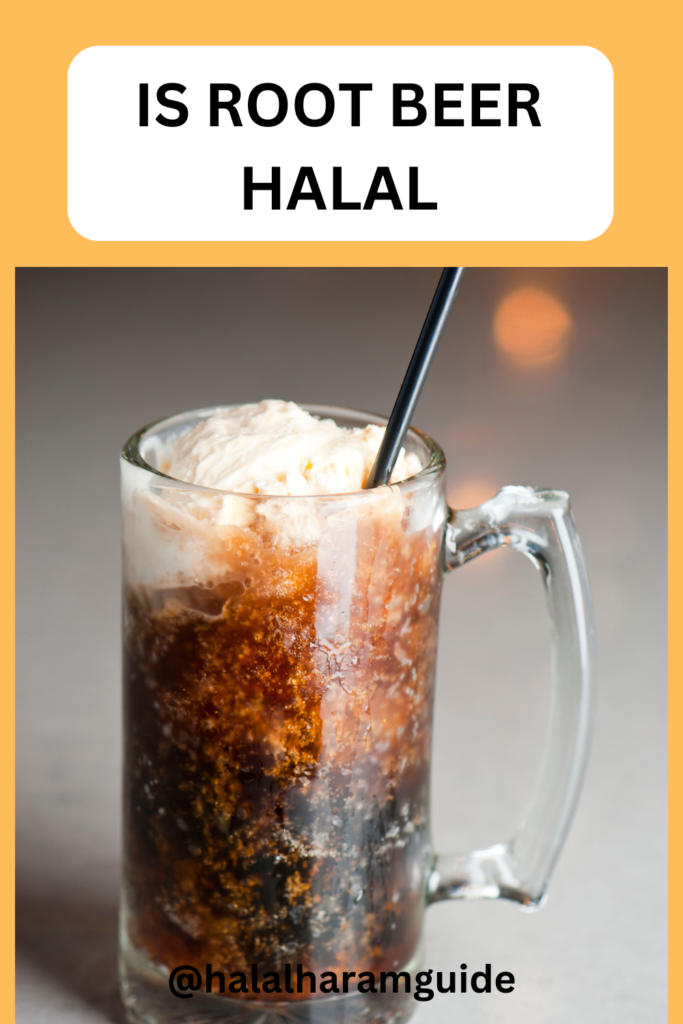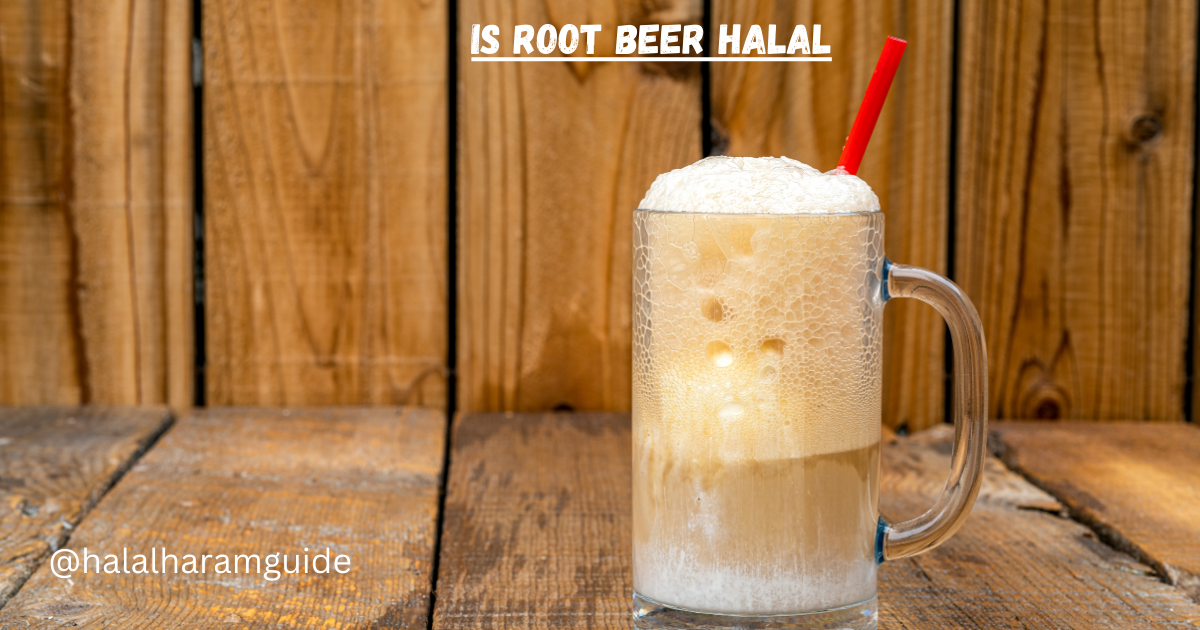In the realm of food and drink, adhering to Halal dietary guidelines is of utmost importance for many Muslims. It’s not just about what’s on the plate; it extends to what’s in the glass as well. Among the array of beverages, root beer has secured a spot as a beloved and iconic favourite. But the question persists: “Is root beer Halal in Islam?”
In this exploration, we journey into the world of beverages to uncover the Halal status of root beer, examining its ingredients, production methods, and the considerations that determine whether it aligns with Islamic dietary laws.
Is Root Beer Halal In Islam?
Whether Root Beer is considered Halal (permissible) in Islam can depend on its ingredients, particularly whether it contains any prohibited or impure substances. Traditional Root Beer is a non-alcoholic beverage made from a combination of roots, herbs, and spices, usually sweetened with sugar.
To determine if a specific Root Beer is Halal, it is important to consider the following:
Alcohol Content: Some types of Root Beer are crafted to have a minimal alcohol content, typically less than 0.5%. In most Islamic jurisprudence, beverages with a very low alcohol content (less than 0.5%) are considered Halal, as the alcohol is considered non-intoxicating.
Ingredients: Check the ingredient list for any prohibited or impure substances, such as alcohol derived from ethyl alcohol (which is usually Haram), or any other Haram ingredients. It’s important to note that some Root Beers may use artificial flavors or extracts that could potentially contain Haram ingredients, so it’s best to verify the source and composition of these ingredients.
Halal Certification: Look for Halal certification on the product. Many food and beverage manufacturers seek Halal certification to ensure that their products comply with Islamic dietary guidelines. A Halal certification can provide assurance that the Root Beer meets the necessary criteria.
Local Interpretations: Keep in mind that interpretations of Halal can vary among different Islamic communities and scholars. Some Muslims may have stricter dietary guidelines, while others may be more lenient. It’s advisable to follow the guidance of a knowledgeable religious authority or organization if you are uncertain about a particular Root Beer’s Halal status.
In summary, whether Root Beer is Halal in Islam depends on its specific ingredients, alcohol content, and any Halal certification it may carry. Careful examination of the product label and, if needed, consultation with a knowledgeable religious authority or scholar can help determine whether a particular Root Beer is considered Halal for consumption.
Hear This Islamic Clarification Before Ordering Root Beer
Before ordering or consuming Root Beer as a practicing Muslim, it’s essential to seek clarification to ensure that it aligns with Islamic dietary guidelines. Here are some key points to consider:
Ingredients: Always examine the list of ingredients on the Root Beer label. Look out for any Haram (forbidden) components such as ethyl alcohol or other prohibited substances.
Alcohol Content: Be aware of the alcohol content, which should typically be minimal, usually less than 0.5%. Islam generally permits the consumption of products with negligible alcohol content.
Halal Certification: Whenever possible, choose Root Beer with a recognized Halal certification. This certification provides assurance that the product has been inspected and meets the necessary Halal requirements.
Local Interpretations: Understand that interpretations of Halal can vary among different Islamic communities and scholars. What may be considered Halal in one community may differ in another. Therefore, it’s advisable to follow the guidelines of your particular religious authority.
Consult a Scholar: If you have specific concerns or questions about a particular Root Beer brand or product, consider consulting with a knowledgeable Islamic scholar or a local Halal certifying organization. They can provide guidance and clarification tailored to your circumstances.
By taking these precautions and seeking clarification, you can make informed decisions regarding the permissibility of consuming Root Beer within the framework of Islamic dietary guidelines. Remember that your intention to adhere to Halal principles is commendable, and seeking knowledge and guidance is an essential part of ensuring that your food and beverage choices align with your faith.
Is Root Beer Alcoholic Or Non-Alcoholic?
Traditional Root Beer is considered a non-alcoholic beverage. It is typically made from a combination of roots, herbs, and spices, sweetened with sugar or a sweetening agent. Root Beer is known for its unique flavor profile, which is often described as sweet, spicy, and aromatic. While it may have a complex blend of flavors, it does not contain significant levels of alcohol.
However, it’s important to note that some modern variations of Root Beer, especially craft or artisanal varieties, may contain trace amounts of alcohol, usually less than 0.5%. These trace amounts of alcohol are not intended to be intoxicating and are often a natural byproduct of the fermentation process used in brewing Root Beer.
In most Islamic jurisprudence, beverages with an alcohol content below 0.5% are considered non-intoxicating and are generally considered Halal (permissible).
As with any food or beverage, it’s advisable to check the label and ingredient list of Root Beer products if you have specific concerns about alcohol content. If the alcohol content is below 0.5%, it is typically considered non-alcoholic and, from an Islamic perspective, would not be considered intoxicating.
However, for individuals who prefer to avoid even trace amounts of alcohol, there are alcohol-free Root Beer options available that are specifically produced to be completely alcohol-free.
Should You Order “Hard” Root Beer For Halal Drink?
The decision to order “Hard” Root Beer or any alcoholic beverage in the context of Halal (permissible) consumption depends on individual beliefs, cultural considerations, and religious adherence.
“Hard” Root Beer is a type of alcoholic beverage that is typically brewed to mimic the flavors of traditional non-alcoholic Root Beer, but it contains alcohol. The alcohol content in “Hard” Root Beer can vary, but it is explicitly alcoholic.
From an Islamic perspective, the consumption of alcoholic beverages, including “Hard” Root Beer, is generally considered Haram (forbidden). Islam prohibits the consumption of intoxicants, and alcohol is considered one such intoxicating substance.
If you adhere to Islamic dietary guidelines and principles, it is recommended to avoid “Hard” Root Beer or any alcoholic beverage, as their consumption goes against these guidelines. Instead, opt for non-alcoholic versions of Root Beer or other non-alcoholic beverages that do not contain intoxicating substances.
It’s important to note that individuals may have varying levels of adherence to religious principles, and cultural and personal beliefs can influence their choices. Some Muslims may choose to abstain from all forms of alcohol, including “Hard” Root Beer, while others may have different interpretations or practices.
Ultimately, the decision regarding whether to order “Hard” Root Beer should align with your personal religious convictions and values. If in doubt or seeking religious guidance, it’s advisable to consult with a knowledgeable religious authority or scholar.
Ingredients Of A&W Root Beer
The exact ingredients of A&W Root Beer can vary slightly by region or product formulation, but here are the typical ingredients found in a traditional A&W Root Beer:
Carbonated Water: This is the primary ingredient, giving the soda its fizziness.
High Fructose Corn Syrup (HFCS): HFCS is a common sweetening agent used in soft drinks. It provides the sweetness in A&W Root Beer.
Caramel Color: Caramel color is added to give the soda its characteristic brown hue.
Sodium Benzoate: Sodium benzoate is a preservative used to extend the shelf life of the product.
Natural and Artificial Flavors: These flavors are responsible for the distinct taste of Root Beer, which includes notes of sassafras, wintergreen, and other spices.
Quillaia Extract: Quillaia extract is a natural foaming agent often used in Root Beer to create a creamy head when poured.
Acacia: Acacia is a plant-derived substance used as an emulsifier and stabilizer.
Yucca Extract: Yucca extract is another natural foaming agent that contributes to the frothy head of Root Beer.
Potassium Sorbate: Potassium sorbate is a preservative used to prevent spoilage.
Conclusion
In conclusion, the Halal status of root beer in Islam hinges on its ingredients and production process. While some root beer brands may be Halal, others may contain ingredients or additives that raise questions for those adhering to Islamic dietary guidelines.
To ensure compliance with Halal principles, it’s essential for Muslims to carefully check the ingredients and certifications of root beer products or opt for Halal-certified alternatives. Ultimately, making informed choices about what one consumes is a significant aspect of practicing Halal dietary habits, even when it comes to enjoying a beloved beverage like root beer.
Frequently Asked Questions
Why Is Root Beer Haram?
Root Beer itself, the non-alcoholic version, is not inherently Haram (forbidden) in Islam. It is typically made from a combination of roots, herbs, spices, sweeteners, and carbonated water, and it does not contain alcohol. However, whether it is considered Halal or Haram can depend on factors such as the specific ingredients and whether it meets Islamic dietary guidelines. Some variations or brands of Root Beer may use prohibited ingredients or alcohol, so it’s essential to check the product label and ingredient list.
Is Beer Halal For Muslims?
Traditional beer, which contains alcohol, is Haram for Muslims. Alcohol is considered intoxicating and is explicitly forbidden in Islam. Muslims are prohibited from consuming alcoholic beverages, and this prohibition extends to traditional beer and other alcoholic drinks.
Is Root Beer Flavor Halal?
The flavor of Root Beer itself, in terms of its taste profile (root-like, sweet, and spiced), is not inherently Halal or Haram. The Halal or Haram status of any product, including flavored items, depends on its specific ingredients and compliance with Islamic dietary guidelines.
Does Root Beer Contain Alcohol?
Traditional non-alcoholic Root Beer does not contain alcohol. However, there are “Hard” Root Beer varieties available that do contain alcohol, and these should be avoided by Muslims who adhere to Islamic principles that forbid the consumption of alcohol.
Which Beer Is Halal in Islam?
Beer, as it is commonly known, is generally not Halal for Muslims due to its alcohol content. However, there are non-alcoholic alternatives available in some markets, often referred to as “non-alcoholic beer” or “alcohol-free beer.” These beverages are formulated to mimic the taste of beer but do not contain alcohol, making them permissible (Halal) for Muslims.
Is A&W Root Beer Halal?
The Halal status of A&W Root Beer or any specific brand may vary depending on the formulation and ingredients used. It’s advisable to check the product label and ingredient list to determine if it contains any Haram (forbidden) ingredients or alcohol. Additionally, seeking guidance from a Halal certifying organization or a knowledgeable religious authority can help clarify the Halal status of specific products.
- “Is Lobster Halal? Understanding Its Permissibility”
- “Is Drawing Haram in Islam? Understanding the Perspective”
- “Is Fermented Kimchi Halal? Exploring Kimchi’s Halal Status”
- “Is Collagen Halal? Unveiling the Halal Status of Collagen”
- “Is Wine Vinegar Halal? Unveiling Its Permissibility”


